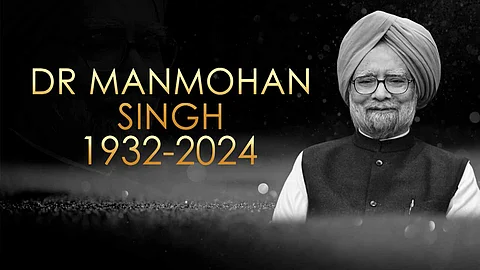
- Home
- Live Blog
- Breaking News
- Top Headlines
- Cities
- NE News
- Sentinel Media
- Sports
- Education
- Jobs

Dipak Kurmi
(The writer can be reached at dipakkurmiglpltd@gmail.com)
Dr. Manmohan Singh, India’s former Prime Minister and the architect of the nation’s economic liberalization, passed away at the age of 92. His demise marks the end of an era, leaving behind an indelible legacy of economic transformation, political astuteness, and unparalleled statesmanship. A luminary of modern India, Dr. Singh’s contributions spanned over five decades, encompassing roles as an economist, reformer, and leader who profoundly influenced the trajectory of the nation.
On December 26, the All India Institute of Medical Sciences (AIIMS), Delhi, announced his passing. Dr. Singh, who had been in frail health for months, succumbed to age-related complications after losing consciousness at his residence earlier that evening. Despite resuscitative measures, he was declared dead at 9:51 p.m. His death has left the nation in mourning, with tributes pouring in from political leaders, intellectuals, and citizens across the country.
Dr. Singh’s life was a testament to the transformative power of vision and perseverance. Born in 1932, his academic journey began at Panjab University and culminated at Oxford University, where he earned a D. Phil in Economics. An illustrious career in academia and bureaucracy followed, with pivotal roles such as Chief Economic Advisor, Governor of the Reserve Bank of India, and Secretary-General of the South Commission in Geneva. His intellectual rigour and economic expertise laid the foundation for his most significant contribution to India’s history—the economic reforms of 1991.
The Architect of Economic Liberalization
As Finance Minister in Prime Minister P.V. Narasimha Rao’s government, Dr. Singh steered India out of an economic abyss. Faced with a severe balance-of-payments crisis, he dismantled the labyrinthine “Control Raj” of permits and licenses, ushering in a new era of economic liberalization. His reforms reduced bureaucratic hurdles, introduced competition, and opened India’s doors to foreign investments and global trade. These changes not only stabilized the economy but also set the stage for unprecedented growth.
Under Dr. Singh’s stewardship, India transitioned from the “Hindu rate of growth” of 3.5% annually to a robust growth rate exceeding 7%. This economic renaissance spurred technological advancements, industrialization, and urbanization, lifting millions out of poverty. The reforms also democratized access to consumer goods, making automobiles, electronics, and improved dietary options available to the burgeoning middle class and lower-income groups.
Dr. Singh’s vision extended beyond economic metrics. He sought to empower the Indian populace by fostering entrepreneurship, encouraging innovation, and promoting education. His policies reflected a commitment to creating a more equitable society while integrating India into the global economic order.
A Statesman of Unmatched Dignity
As Prime Minister from 2004 to 2014, Dr. Singh led the Congress-led United Progressive Alliance (UPA) government with humility and quiet determination. While Sonia Gandhi managed party dynamics and Pranab Mukherjee handled day-to-day governance, Dr. Singh focused on overarching policy frameworks. His leadership style, marked by restraint and intellect, stood in stark contrast to the theatrics often associated with Indian politics.
One of Dr. Singh’s crowning achievements was the Indo-US Civil Nuclear Agreement, which ended India’s decades-long nuclear isolation. Despite vehement opposition from his leftist allies, he demonstrated remarkable courage and conviction, prioritizing the nation’s strategic interests. The deal not only bolstered India’s energy security but also elevated its status as a responsible nuclear power on the global stage.
Dr. Singh’s tenure was also marked by deft diplomacy. He skilfully navigated India’s relationships with neighbouring countries and major global powers, turning international challenges into opportunities. Following the 2008 Mumbai terror attacks, he galvanized global support against Pakistan’s state-sponsored terrorism, isolating Islamabad on the world stage without resorting to military conflict.
The Undervalued Communicator
Despite his monumental achievements, Dr. Singh often struggled to communicate his successes to the masses. His understated demeanour and aversion to self-promotion allowed political rivals to undermine his legacy. Critics accused him of being overly reticent and out of touch with the electorate, failing to effectively counter populist narratives. Yet, history has a way of separating the ephemeral from the enduring, and Dr. Singh’s contributions are increasingly recognized as transformative milestones in India’s development.
A Farewell to a Visionary
Dr. Singh’s passing has elicited tributes from across the political spectrum. President Droupadi Murmu hailed him as “a visionary statesman and one of the greatest sons of Bharat,” while Prime Minister Narendra Modi acknowledged his wisdom, humility, and far-reaching contributions. Congress leaders, including Mallikarjun Kharge and Rahul Gandhi, lauded his integrity, honesty, and unwavering commitment to the nation.
As the nation bids farewell to this iconic leader, it is essential to reflect on the breadth of his legacy. Dr. Singh’s vision extended beyond immediate economic gains; he sought to empower every Indian through opportunities created by an open and dynamic economy. His reforms laid the foundation for India’s ascent as a global power, while his humility and ethical leadership set a benchmark for public service.
Remembering the Good Doctor
Dr. Singh’s journey from a small village in undivided Punjab to the highest echelons of power is a source of inspiration. His life exemplifies the transformative power of education, perseverance, and a steadfast commitment to public welfare. As the world remembers him, the words he spoke in his final press conference as Prime Minister resonate profoundly: “History will be kind to me.”
Indeed, history will remember Dr. Manmohan Singh not only as the architect of India’s economic reforms but also as a statesman who shaped a more prosperous, inclusive, and globally respected India. His legacy will endure as a beacon of hope and progress for generations to come.